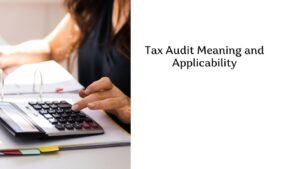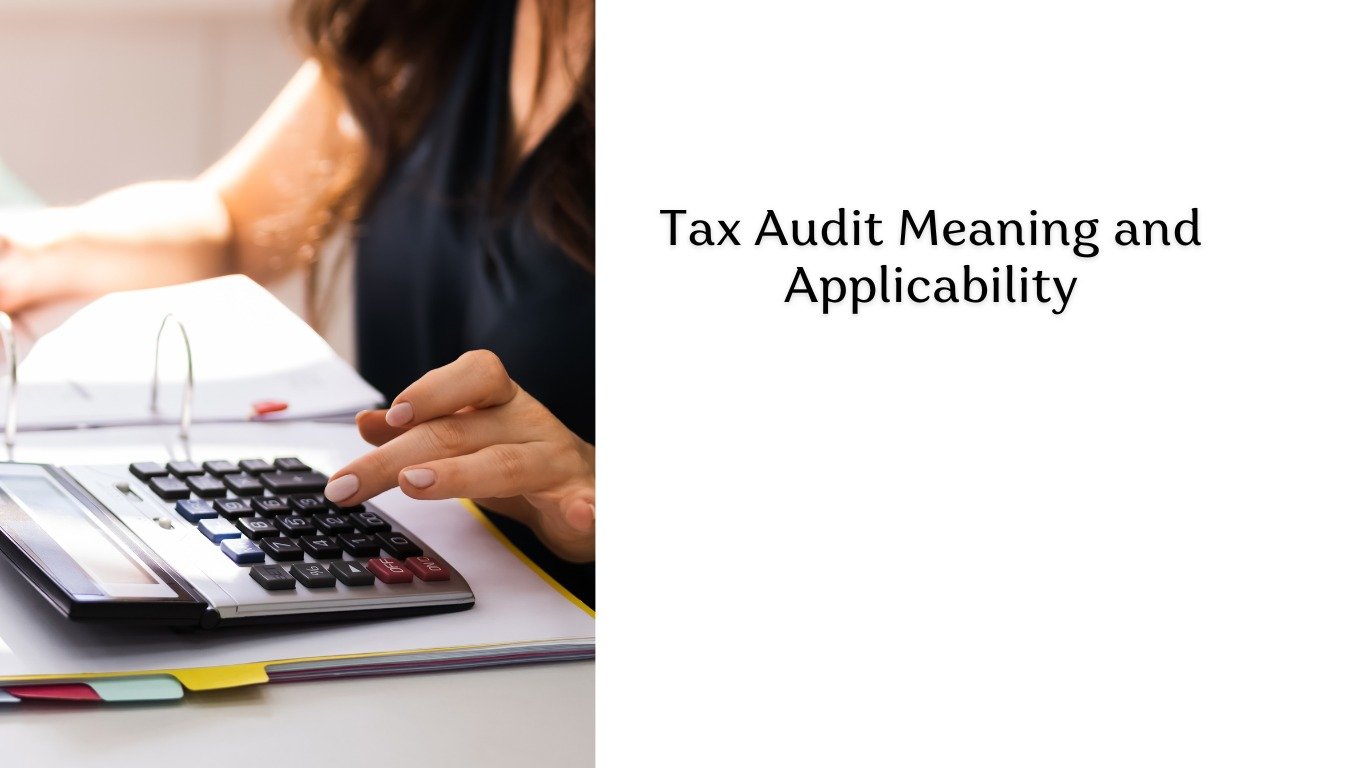
Tax Audit Meaning and Applicability
Tax Audit – Meaning and Applicability:
Tax Audit Meaning and Applicability A tax audit is an examination of financial records conducted to ensure compliance with the provisions of the Income Tax Act. For corporations, audits are already mandated by the Companies Act. Tax Audit Meaning and Applicability Therefore, tax audits are necessary only for businesses not required to undergo such audits under their respective governing statutes. For example, partnerships are not obliged to audit their books under the Partnership Act.
Tax Audit Meaning and Applicability Typically, individuals assess their income tax liability through self-assessment. However, in certain situations, such as surpassing turnover thresholds, the Act necessitates providing proof of income tax liability. Tax Audit Meaning and Applicability To fulfil this requirement, taxpayers must submit their books of accounts for a tax audit to the Income Tax Department.
The scope of a tax audit involves a thorough examination or review of the books of accounts maintained by taxpayers for their business or profession, conducted by a Chartered Accountant (CA). This audit is carried out with a focus on income tax matters. Tax Audit Meaning and Applicability The objective of the tax audit is to verify the accuracy of the income tax liability calculation and ensure compliance with the provisions of the Income Tax Act. The certification provided by a CA through the tax audit instils confidence in the information provided by the taxpayer in their income tax return for the Income Tax Department.
The objectives of a tax audit include:
- Ensuring accurate maintenance and correctness of the books of accounts by certifying them through a Chartered Accountant (CA), enabling the Income Tax Department to verify the accuracy of the information in the taxpayer’s income tax returns.
- Reporting observations and discrepancies identified during a systematic examination of the books of accounts.
- Providing the Income Tax Department with necessary information as per the Act, including allowable depreciation and compliance with various provisions of the Act.
Applicability of Tax Audit
Tax Audit Meaning and Applicability To determine if Tax Audit is applicable to an assessee, several parameters need to be considered. These include whether the assessee has opted for a presumptive taxation scheme, the turnover of the assessee, and whether the assessee’s total income exceeds the basic exemption limit. Tax Audit Meaning and Applicability The following table can be used to ascertain whether Tax Audit is applicable to an assessee:
Below is a summary table outlining whether Tax Audit is necessary for different categories of taxpayers:
| Category of Taxpayer | Tax Audit Required? |
| Business, not opted for presumptive income scheme | Tax Audit is necessary if total sales, turnover, or gross receipts exceed one crore rupees. |
| Business, opted for presumptive taxation under Sections 44AE, 44BB, or 44BBB | Tax Audit is necessary if the assessee claims profits lower than the prescribed limit under the presumptive taxation scheme. |
| Business, opted for presumptive taxation under Section 44AD | Tax Audit is necessary if the assessee claims profits lower than the prescribed limit under the presumptive taxation scheme and has a total income exceeding the basic exemption limit. Additionally, Tax Audit is required if sales, turnover, or gross receipts exceed two crore rupees. |
| Business, not eligible for presumptive taxation under Section 44AD | Tax Audit is necessary if the assessee’s total income exceeds the basic exemption limit. |
| Profession, not opted for presumptive income scheme | Tax Audit is necessary if total gross receipts exceed fifty lakh rupees. |
| Profession, opted for presumptive taxation under Section 44AD | Tax Audit is necessary if the assessee claims profits lower than the prescribed limit under the presumptive taxation scheme and has a total income exceeding the basic exemption limit. |
| Incurred loss from business, not opted for any presumptive scheme | Tax Audit is necessary if total sales, turnover, or gross receipts exceed one crore rupees and the taxable income exceeds the basic exemption limit. |
| Incurred loss from business, opted for presumptive scheme under Sections 44AD, 44ADA, or 44AE | Tax Audit is necessary if the total income exceeds the basic exemption limit. |
Statutory Audit Vs. Tax Audit
Tax Audit Meaning and Applicability Under various laws such as the Companies Act and Societies Registration Act, entities may be required to undergo an audit of their books of accounts. If the assessee is already obligated to have their accounts audited under a law other than the Tax Audit Meaning and Applicability Income Tax Act, then there is no need for an additional audit to fulfil the requirement under the Income Tax Act. It suffices if the assessee’s books of accounts are audited under the other law, provided that the audit under the other law is completed before the due date for filing the return.
The taxpayer can then submit a prescribed audit report under the Income Tax Audit Meaning and Applicability Tax law stating that since the accounts have already been audited in accordance with the requirements of If the accounts have already been audited under another law, an audit under the Income Tax Act is not required.
Filing Requirements
Tax Audit Meaning and Applicability In cases where the assessee is required to undergo a tax audit as per the provisions of the Income Tax Act, they need to file the following forms along with their Income Tax return:
- Form 3CA: This form is utilised when the assessee’s books have already undergone audit under other laws, such as the Companies Act or the Societies Registration Act. Tax Audit Meaning and Applicability In such instances, there is no need for a second audit to fulfil the requirement under the Income Tax Act.
- Form 3CB: This form is employed when the assessee’s books are audited solely to meet the requirements of the Income Tax Act.
E-submission of Tax Audit Report
The Chartered Accountant (CA) responsible for auditing the assessee’s books must submit the tax audit report online using the appropriate login credentials. Additionally, Tax Audit Meaning and Applicability the taxpayer should input the CA’s details into their own login portal. After the tax auditor uploads the audit report, the assessee must accept it within the specified timeframe via their login portal. Failure to accept the report within this timeframe or rejection of the report necessitates the auditor to initiate the filing process anew.
Due Date for Filing Report
The tax audit report must be filed by all taxpayers on or before the due date. Tax Audit Meaning and Applicability If the assessee has engaged in an international transaction, the due date is 30th November. For all other cases, the due date is 30th September.
Penalty for Delay
If a taxpayer who is required to undergo tax audit fails to comply with the requirement, the penalty imposed can be the lesser of the following:
- 0.5% of the total sales, turnover, or gross receipts
- One hundred fifty thousand rupees
Tax Audit Limit
The Tax Audit limit refers to the threshold turnover amount that, when exceeded, necessitates a tax audit under the Income Tax Act. Tax Audit Meaning and Applicability This limit varies for different categories of assesses, such as sole proprietors, partnership firms, limited liability partnership (LLP) firms, or companies. Additionally, Budget 2020 has increased the turnover limit for MSME assesses to provide them with relief.
Threshold for Sole Proprietorships
For proprietorship firms, taxation is carried out on an individual basis under the Income Tax Act. Therefore, if a proprietor’s Tax Audit Meaning and Applicability business sales turnover exceeds one crore rupees, a tax audit is mandatory. Similarly, if an individual is engaged in a profession with gross receipts exceeding fifty lakh rupees, a tax audit is also mandatory.
Threshold for Partnership Firms
Partnership firms engaged in a profession must undergo a tax audit if their gross receipts exceed fifty lakh rupees. Similarly, partnership firms engaged in business activities must Tax Audit Meaning and Applicability undergo a tax audit if their sales turnover exceeds one crore rupees.
Threshold for LLPs
Tax Audit Meaning and Applicability According to the regulations governing Limited Liability Partnerships (LLPs), LLPs with an annual turnover exceeding forty lakh rupees or capital contribution amounting to twenty-five lakh rupees are mandated to undergo audit by Tax Audit Meaning and Applicability a Chartered Accountant (CA). If these criteria are not met, the conditions outlined for a partnership firm must also be considered.
Limit for Companies
All forms of companies, including private limited companies and one person companies, are mandated to undergo an audit.
The term “limit for companies” may refer to various aspects depending on the context, but one common interpretation is the concept of limits or restrictions imposed on companies in different areas of operation. These limits can include financial constraints, regulatory boundaries, or operational thresholds.
Financial limits for companies may involve constraints on borrowing, investment, or spending, often set by internal policies, lenders, or regulatory bodies. These limits ensure that companies operate within their means and avoid excessive risk-taking.
Regulatory limits for companies refer to restrictions imposed by government authorities or industry regulators to ensure compliance with laws and regulations. These limits may pertain to areas such as environmental standards, labor practices, product safety, or financial reporting requirements.
Operational limits for companies may include constraints on production capacity, market share, or geographic expansion. These limits are often influenced by factors such as resource availability, market demand, or competition.
Overall, understanding and adhering to these limits is crucial for companies to operate sustainably, mitigate risks, and maintain compliance with legal and regulatory requirements.
Keywords: Limit for Companies, Financial Constraints, Regulatory Boundaries, Operational Thresholds, Compliance, Risk Mitigation.
Limit for MSMEs
Tax Audit Meaning and Applicability For Micro, Small, and Medium Enterprises (MSMEs), a tax audit is necessary if the turnover exceeds five crore rupees. Previously, this limit was set at one crore rupees. However, this enhanced limit applies only to those MSMEs whose total cash transactions do not exceed 5% of the total transactions. Tax Audit Meaning and Applicability This change was introduced by the Government through the budget announced on February 1, 2020.
SOURCES: https://cleartax.in/s/tax-audit-section-44ab
FOR MORE INFORMATION: https://taxgyany.com/

